
Guests
- Teresa Helmsurvivor of sexual abuse perpetrated by Jeffrey Epstein and facilitated by Ghislaine Maxwell.
We speak to a survivor of sexual abuse perpetrated by Jeffrey Epstein and enabled by his partner Ghislaine Maxwell. Teresa Helm was sexually assaulted by Epstein at what she was told was a job interview in the early 2000s. She now works as the survivor services coordinator for the National Center on Sexual Exploitation and joins many voices calling for the release of federal documents pertaining to Epstein’s criminal case, though Helm emphasizes that the goal of their release must be to promote accountability and justice for victims, not as a form of political score-settling. “I really urge everyone to focus their commitment, their intention, all this time, effort and energy onto … these survivors and their healing,” says Helm. “We’re talking about people’s lives, and it should not be weaponized either way, in any administration.”
Transcript
AMY GOODMAN: This is Democracy Now!, democracynow.org, The War and Peace Report. I’m Amy Goodman.
Missing in much of the MAGA frenzy over the Jeffrey Epstein files are the voices of survivors of the sexual abuse he perpetrated against them. Many, like our next guest, have joined the call for transparency and for the Trump administration to release the files as promised.
This comes as Virginia Giuffre, an outspoken survivor of sex trafficking by Jeffrey Epstein, died, apparently by suicide, at age 41 in April. She was the first survivor to come out publicly against Epstein and his co-conspirator, Ghislaine Maxwell, who remains in prison. She also sued Prince Andrew for sexually assaulting her when she was 17. The disgraced prince was forced to step away from his royal duties and settle with Giuffre in 2022. Her family said in a statement, quote, “Virginia was a fierce warrior in the fight against sexual abuse and sex trafficking. She was the light that lifted so many survivors,” unquote.
Just last week, when the FBI and Department of Justice announced there was, quote, “no incriminating client list,” it also said Epstein harmed over 1,000 victims over two decades, far more than previously known.
For more, we’re joined by Teresa Helm, who is a survivor of sexual abuse by Jeffrey Epstein, facilitated by Ghislaine Maxwell. She was assaulted by Epstein in the early 2000s. She now works as the survivor services coordinator for the National Center on Sexual Exploitation. Her 2024 piece for Newsweek is headlined “I’m a Jeffrey Epstein Survivor. The Documents Are an Opportunity.”
Thank you so much for joining us. You, Teresa Helm, have talked about the dangers of grooming. As you see all of this taking place, the uprising within the MAGA movement, lost are what sexual violence survivors go through. Talk about how you first met Jeffrey Epstein, how you were brought to him, how you were groomed.
TERESA HELM: Well, hello. Good morning. I can certainly talk to that.
So, I was attending college out in California at the time and was a full-time student and a full-time employee there. And so, that began the process of recruitment to grooming, passed along the line from various people as far as “This is an opportunity that I’d like for you to see if you’re interested in, and go talk to this person.” So, after speaking with a couple young women about an opportunity that I thought I was being blessed with at the time, I eventually met with Ghislaine Maxwell, who really — what she did was pretty astounding, in the fact that within a day I was convinced that I was in a safe, healthy, wonderful environment, blessed with an opportunity to pursue a career that I could — had only dreamed of having. In fact, that was my dream, to do what she had stated I would do alongside her, working for her. She was very polite and kind. She built trust in a very — you know, within hours, I thought that I had really landed the opportunity of a lifetime. My family was very pleased that I was there interviewing with her, which is what — the intention. That’s what the — that’s what I thought I was there for, was an interview. And things went so amazingly well. And then, she was so successful in all of that very, I would call it, you know, master manipulation. She was very calculated in her craft and did it very well.
I was very young. I mean, I was an adult, 22 years old. However, I had such big dreams and aspirations and determination and really wanted to make the most of this opportunity that I thought that I was getting, to the point where at the end of my time with Ghislaine Maxwell, although I hadn’t known that there was a partner, as she referred to him, that I would be meeting at the end of my time with her — I hadn’t heard Jeffrey or any other person’s name the entire time, from beginning, sitting behind the desk at work in California at the college, to meeting Sarah Kellen at the beach to — who then introduced me to Ghislaine. I had no idea that there was a final person that I was going to go meet.
And once I learned of him, by the name of Jeffrey, I did not — I paused and thought about some things, waived any kind of red flag in my mind, because, again, she was so — Ghislaine was so, so good at what she had done and built that trust in me. And so, then I walked — I walked myself to Jeffrey’s home later that day to what I thought was to interview with him, without really a lot of question, actually being quite excited, because I thought, “Well, if I was so successful here with Ghislaine, which she has really made me believe that I have been, now I get the opportunity to go complete this, like a second round of the interview.” And that was — really, I walked myself into tragedy. I had no idea. I could — I actually should and I will reframe that. I didn’t walk myself into tragedy. I was lured there. I was coaxed there, coerced there, under false and fraudulent, you know, conditions and expectations.
AMY GOODMAN: And it was there —
TERESA HELM: And that’s how I —
AMY GOODMAN: It was then that Jeffrey Epstein assaulted you?
TERESA HELM: That’s right, there in his very big, beautiful home there in Manhattan, you know, the home that Ghislaine was raving about after I had been complimenting her on her home and speaking about the different various buildings and the architecture and how much I enjoyed it and comparing different cities to New York. And then she raved about his: If I thought hers was great, wait ’til I see his. Yeah, so, it was there.
AMY GOODMAN: So, you have joined the call for the Epstein files to be released. Can you explain why you feel this is so important?
TERESA HELM: Where I stand with all of this is in, you know, utter solidarity with survivors of this entire nightmare that’s just been ongoing for decades with these people that have gotten away with so much for so long, you know, whether it was a failure of the system back in the ’90s, whether failure of the system again in the early 2000s. There are so many women and, at the time, even, you know, children that have been harmed by these people.
I really urge everyone to focus the — you know, the commitment, the intention, all this time, effort and energy onto bringing to light what needs to bring to light for these survivors and their healing, and less about political weaponization of anything, because at the end of the day, that’s what we’re talking about. We’re talking about people’s lives, and it should not be weaponized either way in any administration, no matter who’s in control at the time, who did what, when, who’s doing what now. Transparency is key, because we cannot move forward as a society and as a culture without these fundamental changes of — these fundamental changes of doing the right thing and holding people accountable, because we can’t continue to have systems of power that just get away, or people — whether it’s a system or a person, we cannot continue to have these people or systems continue to get away with anything that they can get away with, because they’re not — they’re skating through. They’re dodging accountability. There’s too much money involved, so, you know, people silenced through money.
We have got to change the — it’s degrading our society to continue to allow these predators and perpetrators to get away with harming so many people. You know, those that harm and exploit, they have to be silenced, not the survivors continuing to be silenced, because when you don’t have accountability, you don’t have justice. We are so far out of balance with justice. It’s almost like, you know, Lady Liberty, she can take us a small step to the ground, because we’re so uneven, where survivors are holding on, clinging on to hope, which tends to be, you know, one thing that you can’t take away from a survivor. It’s how we get here. We survive through it because we have so much hope. But hope tends to get shattered often. And it’s like the onus is on us to pick up the pieces and try to get louder and louder. You know, our silence is not — it’s very loud within us. We have to then — you know, we’re tasked with rising back up, fighting bigger, fighting louder, you know, screaming from the mountaintops.
Like, who is going to do something? Because we are setting horrible, horrible influences to our children and to our youth of what you can and can’t get away with, depending on who you are, what position you are in. And as I said, I just feel like, you know, oftentimes we have these huge-profile cases where people are harming others, and there’s just such a big — you know, “Did this really happen to you? Well, if it did, what about this?” We have to get to the point where we are survivor-focused in the justice system, because we’re such a huge part of it that we have to stop politicizing everything and listen to the survivors, listen to the ones that have the lived experience. You cannot take this experience — people can say there’s nothing there. You cannot take the lived experience away from us, not that we wanted it in the first place, but here it is. It lives with us. It remains with us. We’re fighting for justice. You cannot take away our lived experience.
AMY GOODMAN: Well, Teresa Helm, I want to thank you so much for being with us. We’re going to link to your piece, “I’m a Jeffrey Epstein Survivor. The Documents Are an Opportunity.”
When we come back, we’re going to go to Ro Khanna in the Capitol, who is introducing a bill to deal with the Epstein files, to have them released. Stay with us.
[break]
AMY GOODMAN: “Garner Poem” by Mourning [A] BLKstar in our Democracy Now! studio. Thursday marked the 11th anniversary of the police killing of Eric Garner, who died after a New York police officer held him in a chokehold. Eric Garner’s pleas of “I can’t breathe,” captured on video by a witness, became a global rallying cry against police brutality. The now ex-NYPD officer Daniel Pantaleo remains a free man after a jury and the Justice Department declined to charge him for the killing of Eric Garner.

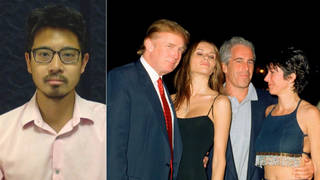
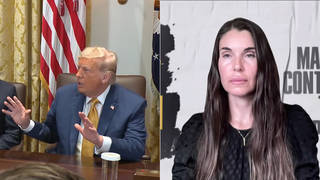
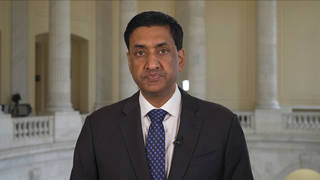
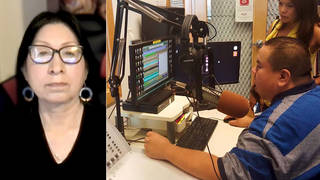






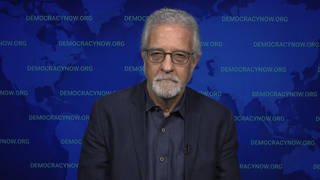
Media Options